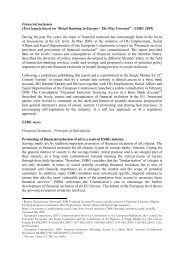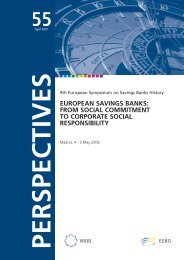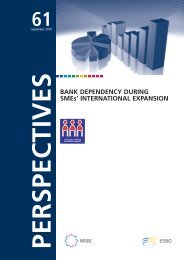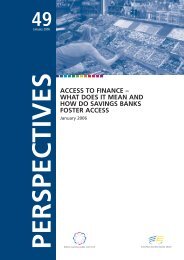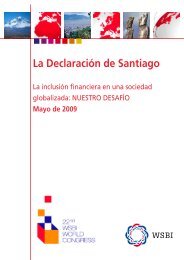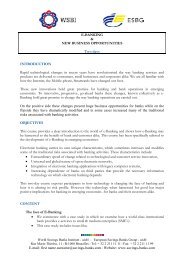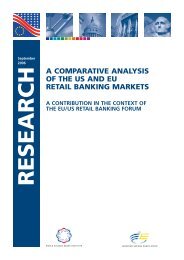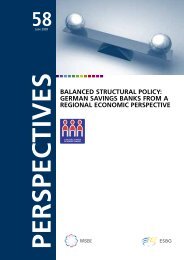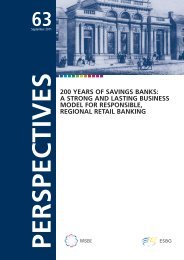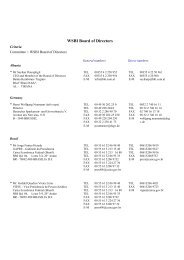Corporate Governance and Access to Finance - ESBG
Corporate Governance and Access to Finance - ESBG
Corporate Governance and Access to Finance - ESBG
Create successful ePaper yourself
Turn your PDF publications into a flip-book with our unique Google optimized e-Paper software.
3.3. Mutuals <strong>and</strong> cooperativesThis organizational structure presents three characteristics very relevantfor <strong>Corporate</strong> <strong>Governance</strong>:1. The voting rights may be not proportional <strong>to</strong> the size of the stake (forexample, one person, one vote).2. There is no separation between cus<strong>to</strong>mer <strong>and</strong> owner, as ownershiprights can accrue by becoming a “cus<strong>to</strong>mer”.3. Each owner has a claim <strong>to</strong> residual net worth, which is usually “nonexclusive”: typically new members can join on equal terms <strong>to</strong> those ofprevious ones. Ownership claims are not explicit <strong>and</strong> marketable, as ina limited company.If owners are also the cus<strong>to</strong>mers, the implication is that the person withwhom business is done is the person for whom business is done (Penrose,2004). This has two important implications for <strong>Corporate</strong> <strong>Governance</strong>:(i) its definition is less clear, because of the ambiguity of the firms’objectives in the case of mutuals, due <strong>to</strong> the absence of an equivalent ofmaximizing shareholders’ value; <strong>and</strong> (ii) the main types of <strong>Corporate</strong><strong>Governance</strong> conflicts arise among the owners, since their interest tend<strong>to</strong> be different.The non exclusive claim implies that a mutualist cannot prevent thatthe mutual does business with new cus<strong>to</strong>mers, who join the mutual withthe same rights than the former mutualists. Its capital is built fromaccumulated profits, leaving aside subordinated debt <strong>and</strong> similar financialinstruments. This has several implications:1. Market discipline is inexistent or very weak.2. There is no distribution of profits <strong>to</strong> owners, except the possibility<strong>to</strong> dedicate part of these profits <strong>to</strong> improve the products in favor ofthe owners, as it is typical in insurance mutuals.3. Mutuals enjoy a theoretical advantage in the cost of capital, in thesense that it does not need <strong>to</strong> be explicitly remunerated.More details on <strong>Corporate</strong> <strong>Governance</strong> of mutual banks can be foundin Llewellyn (2007), in particular for British building societies.Although these entities are not members of WSBI, they are a goodexample of mutual banks.52



